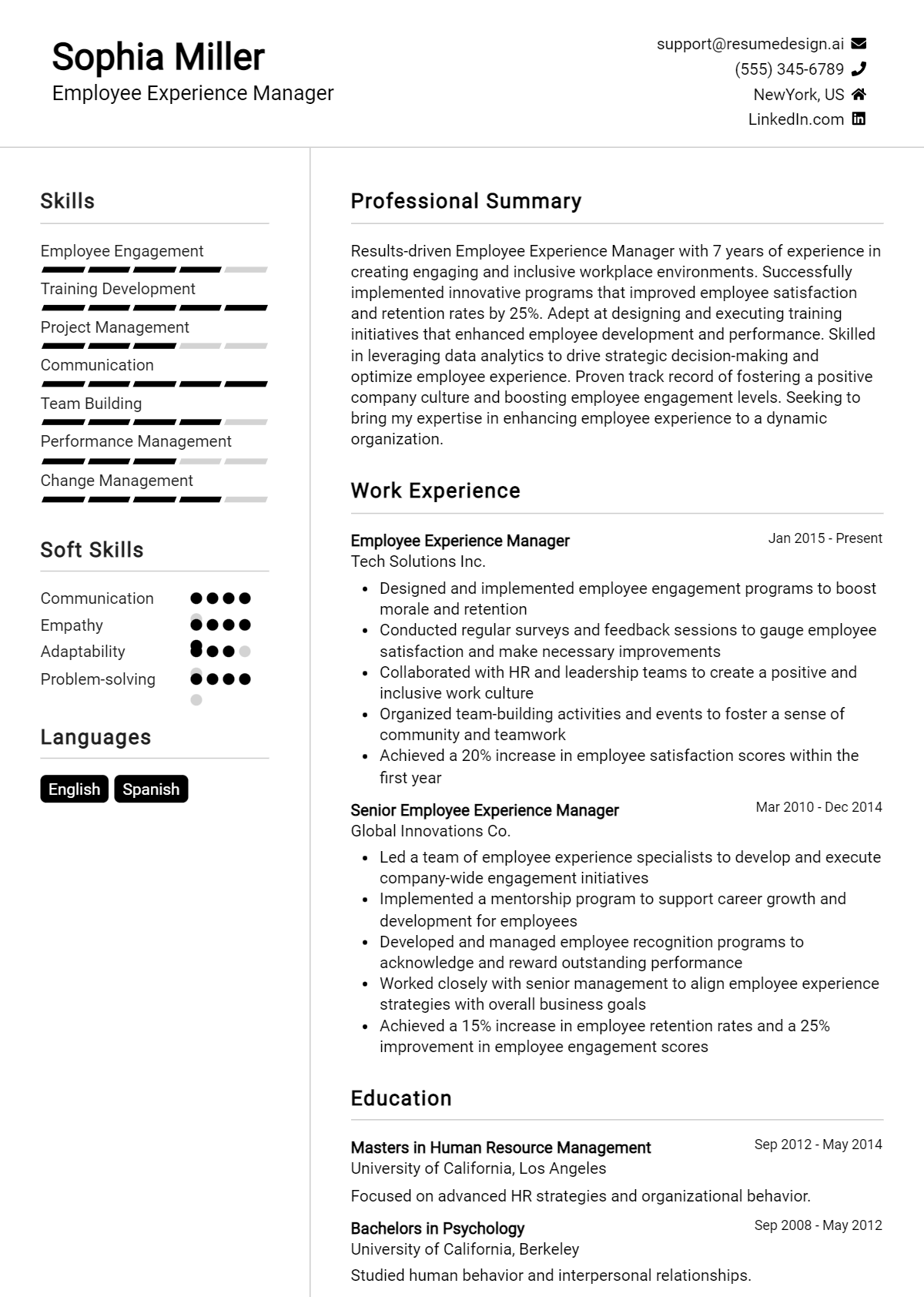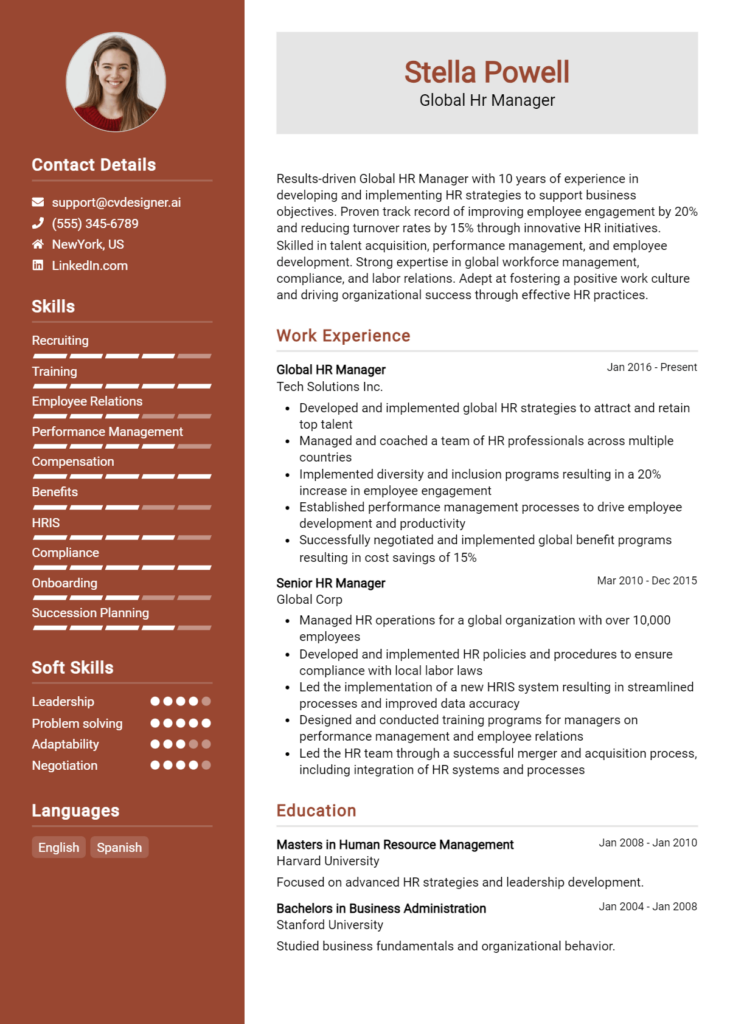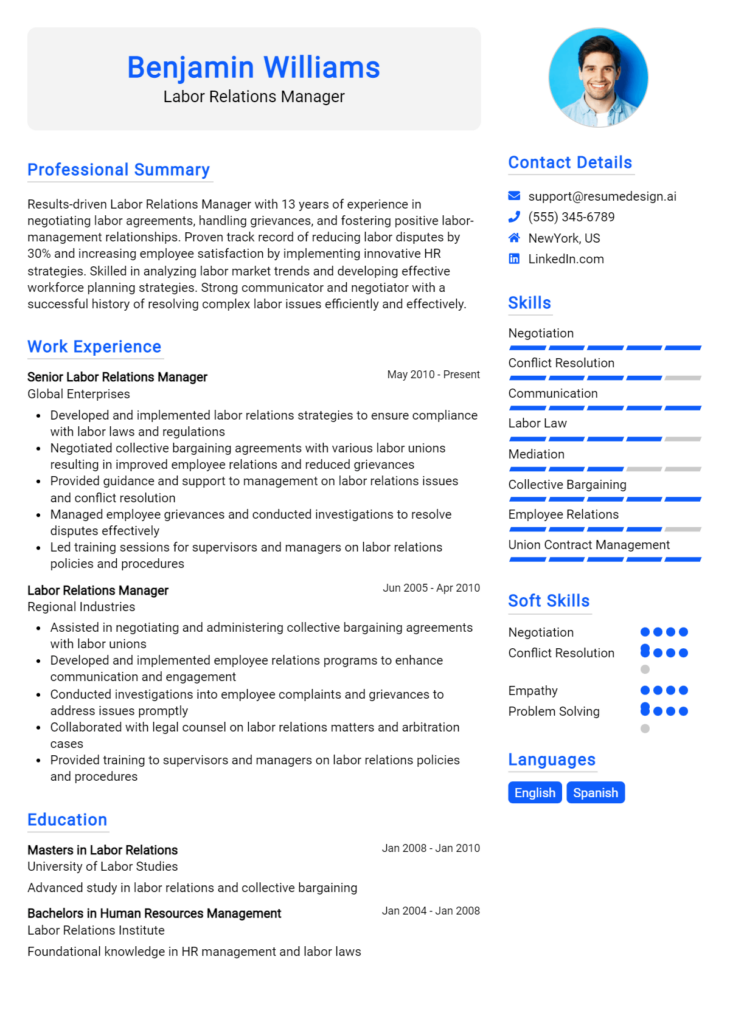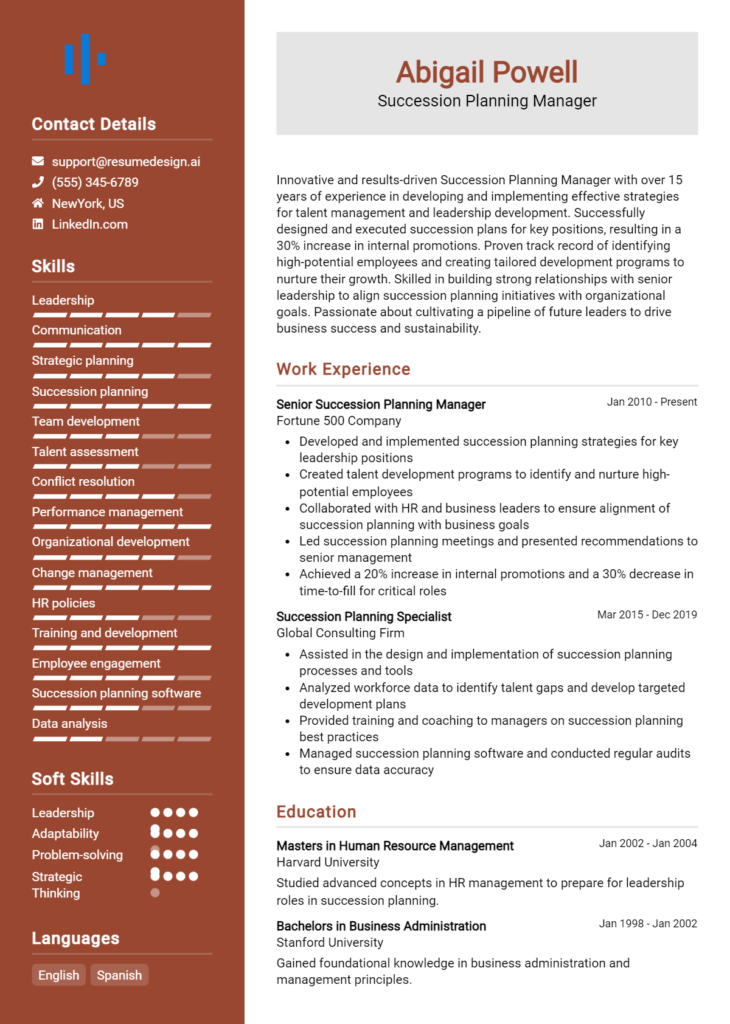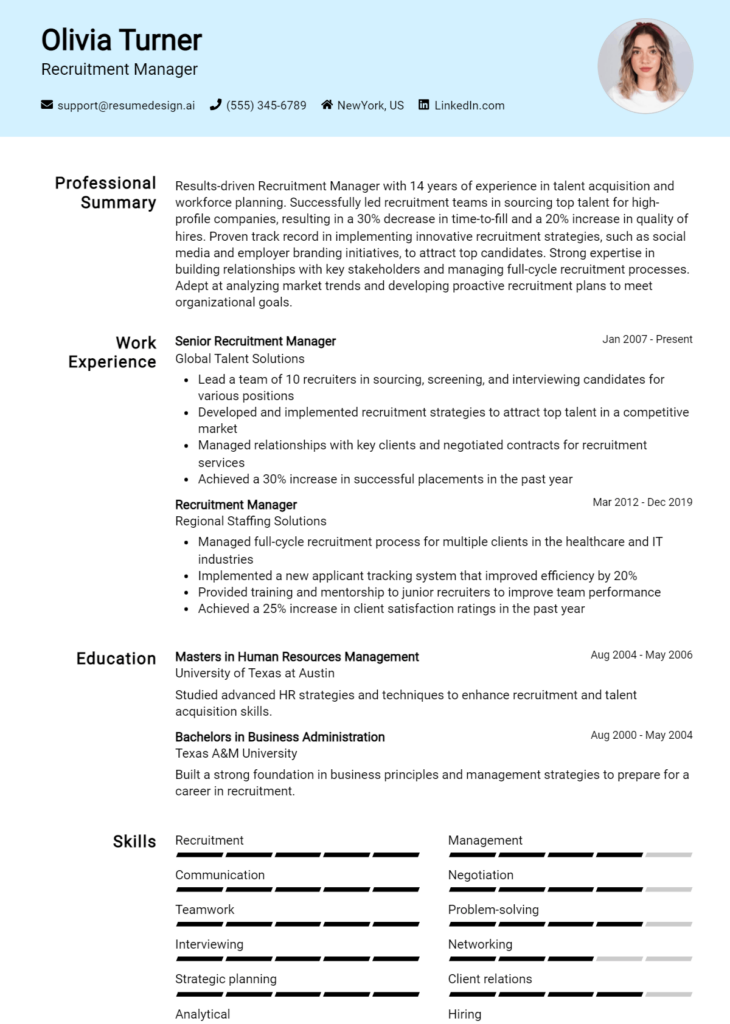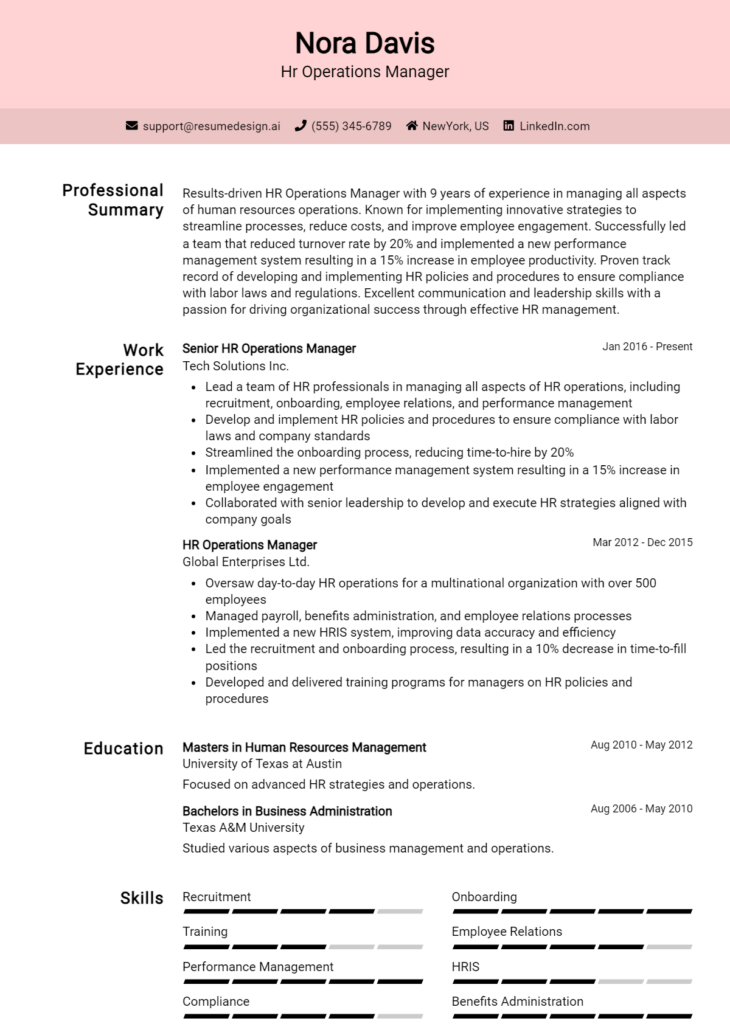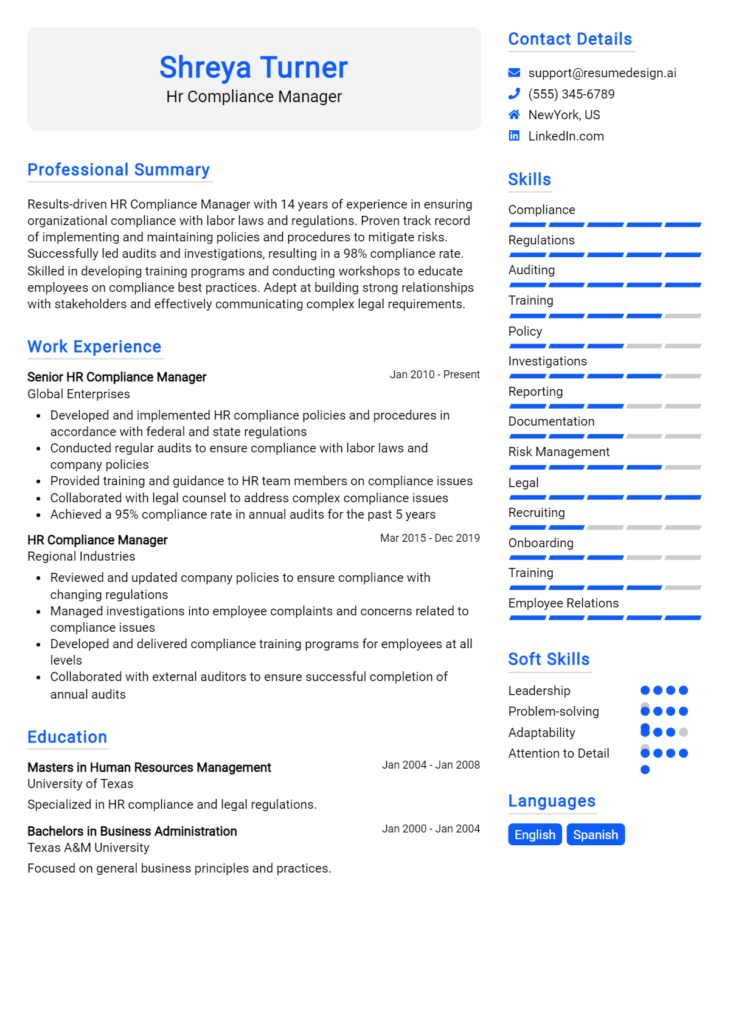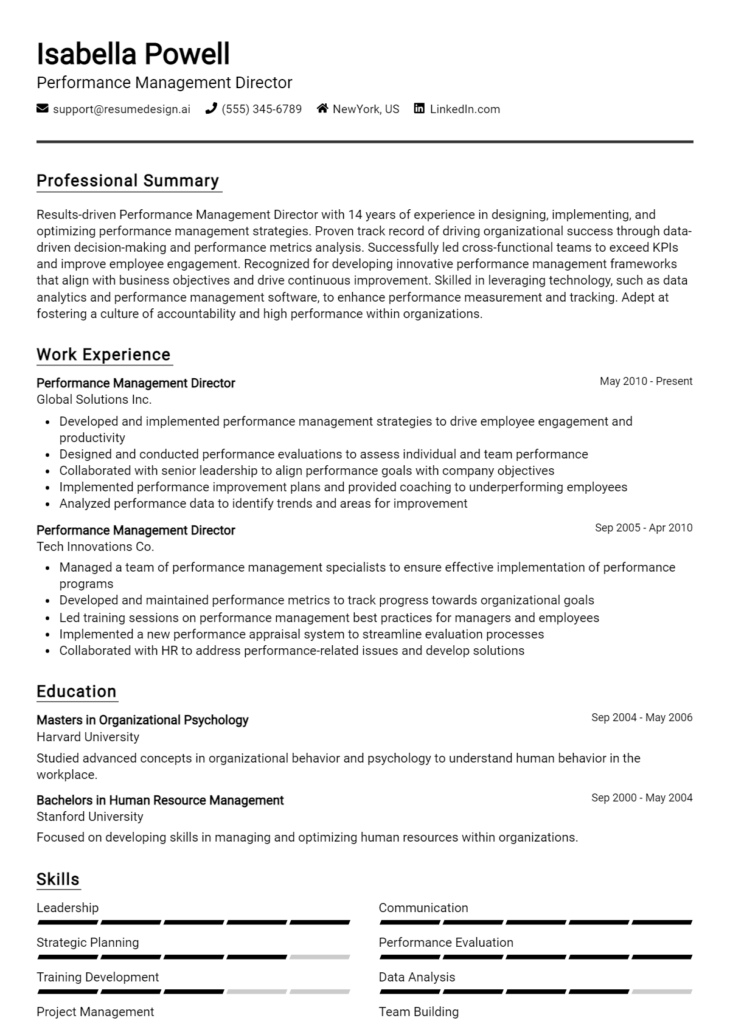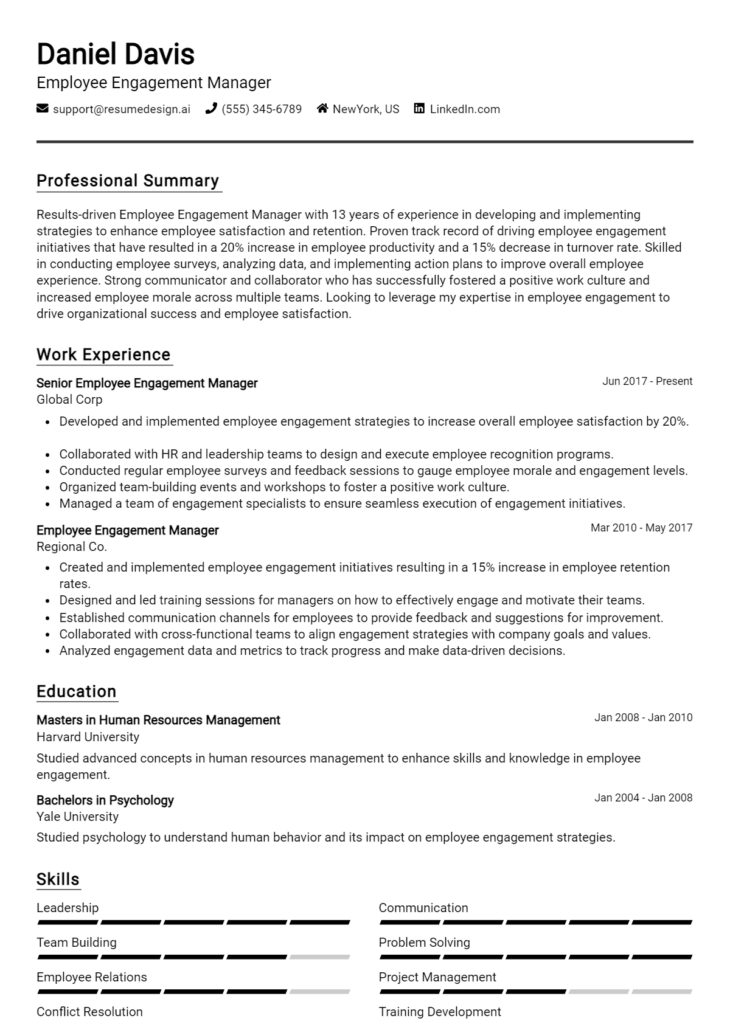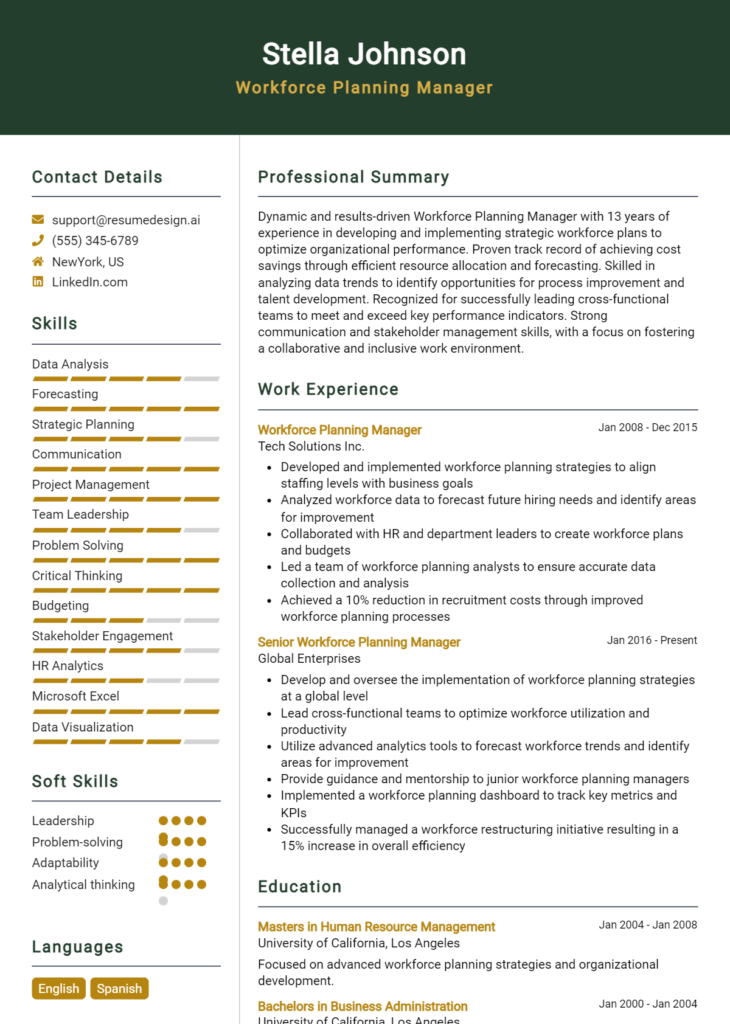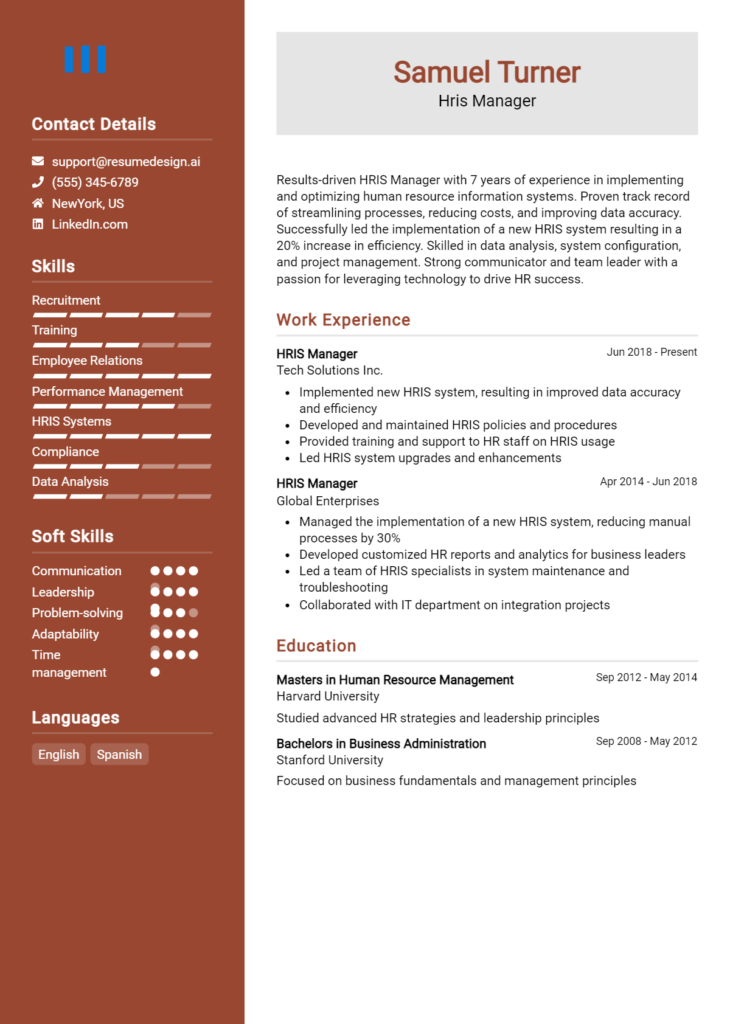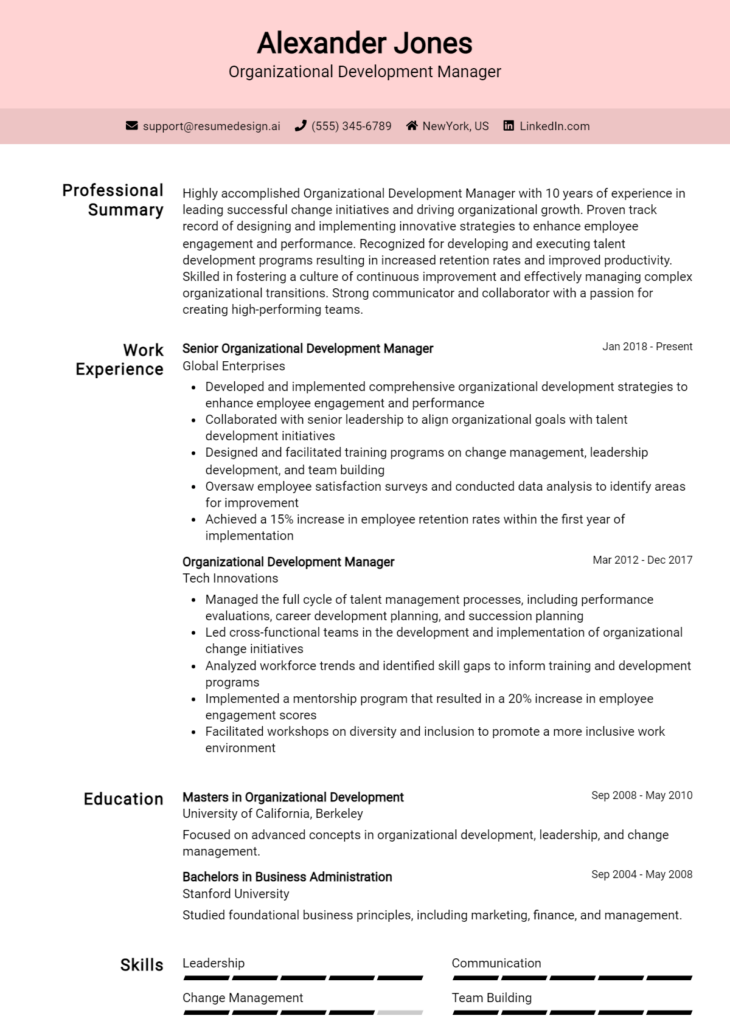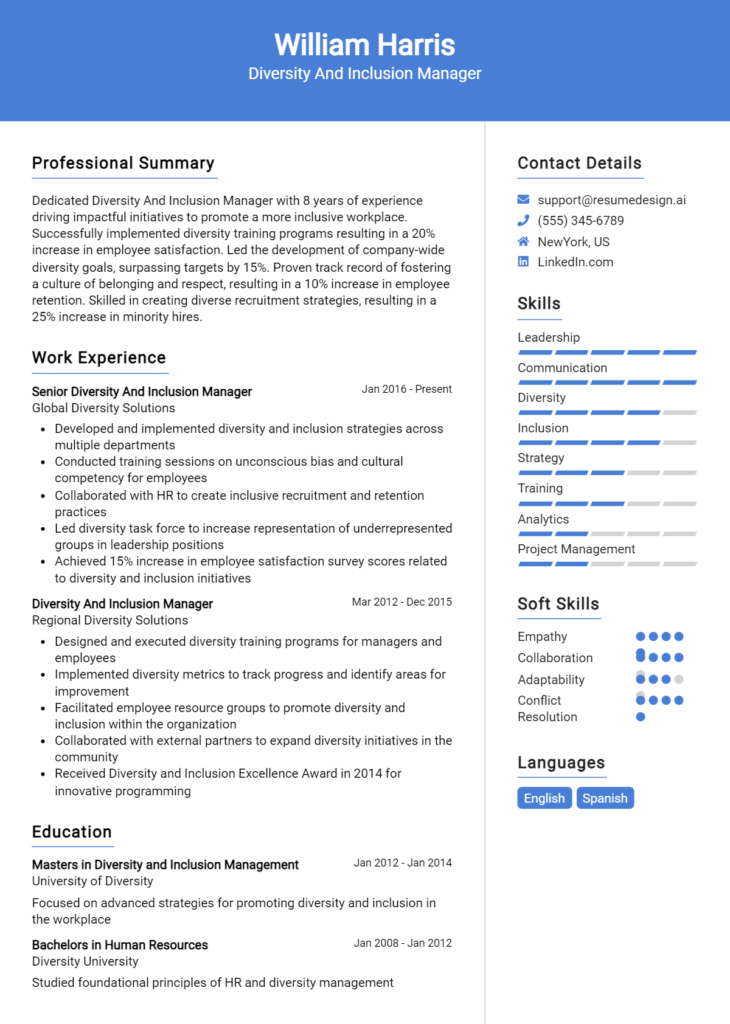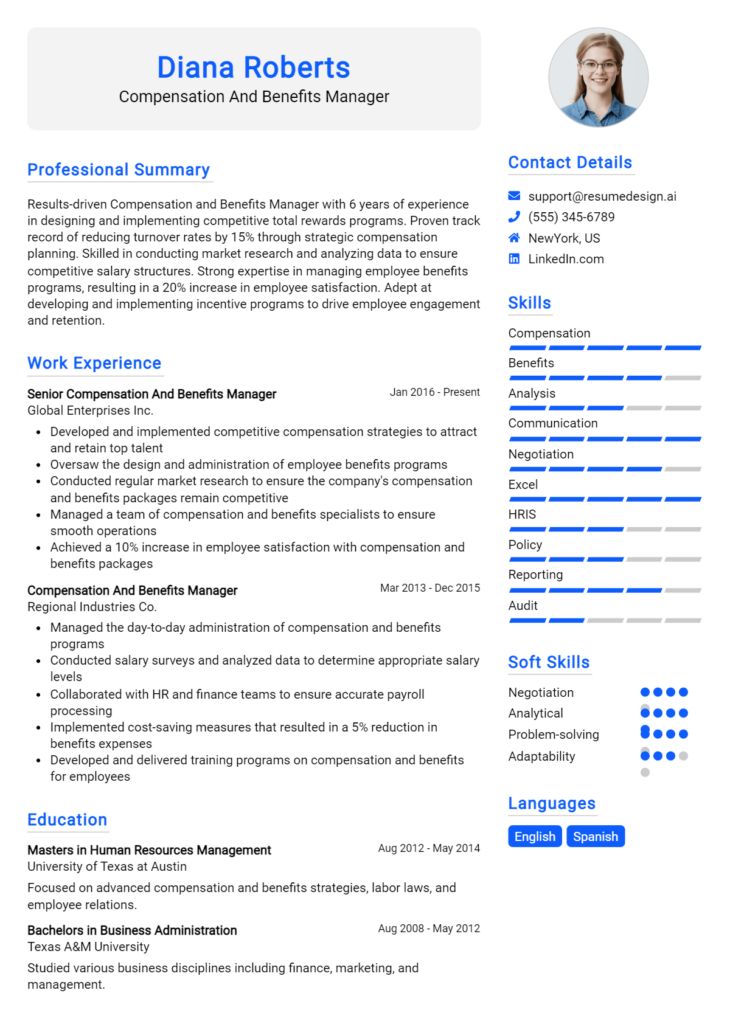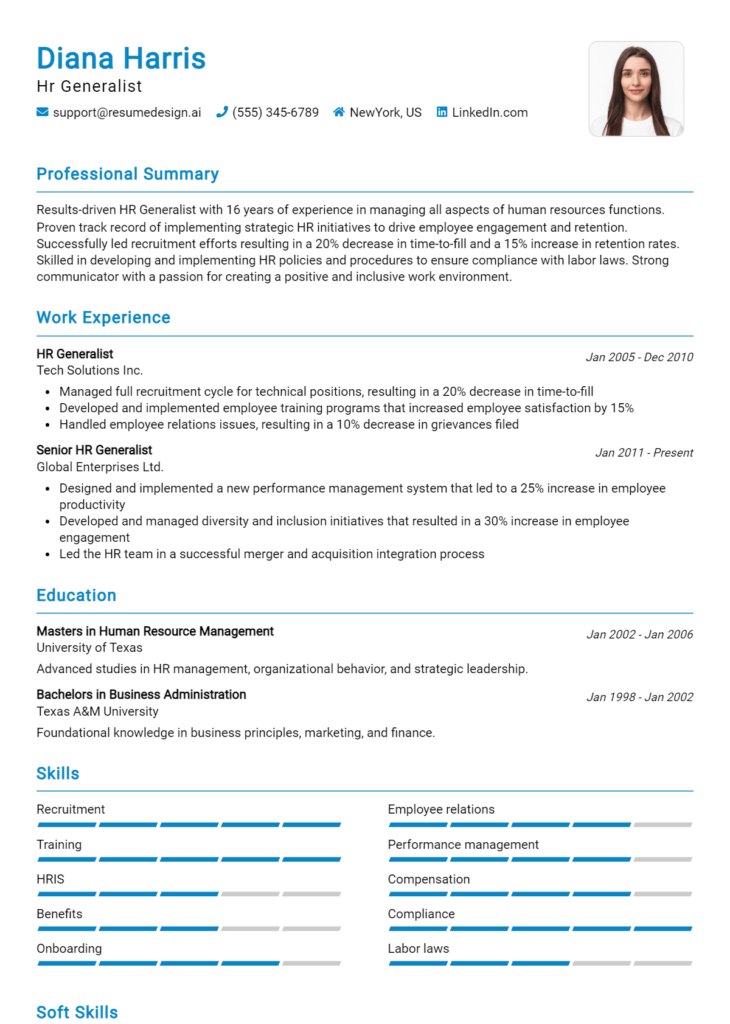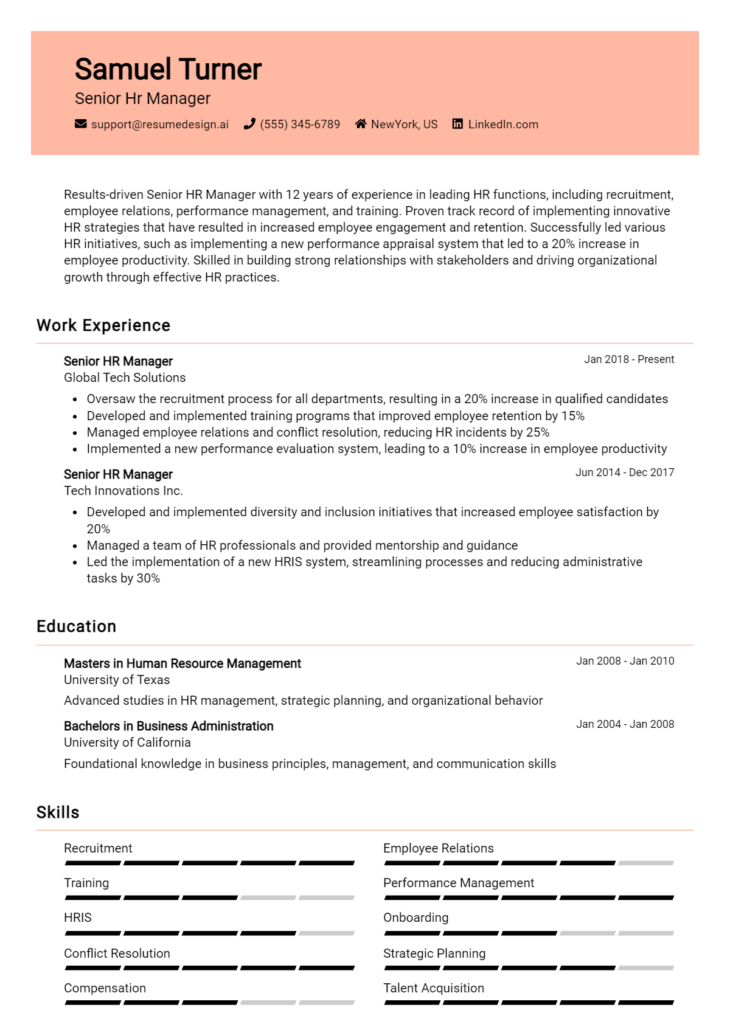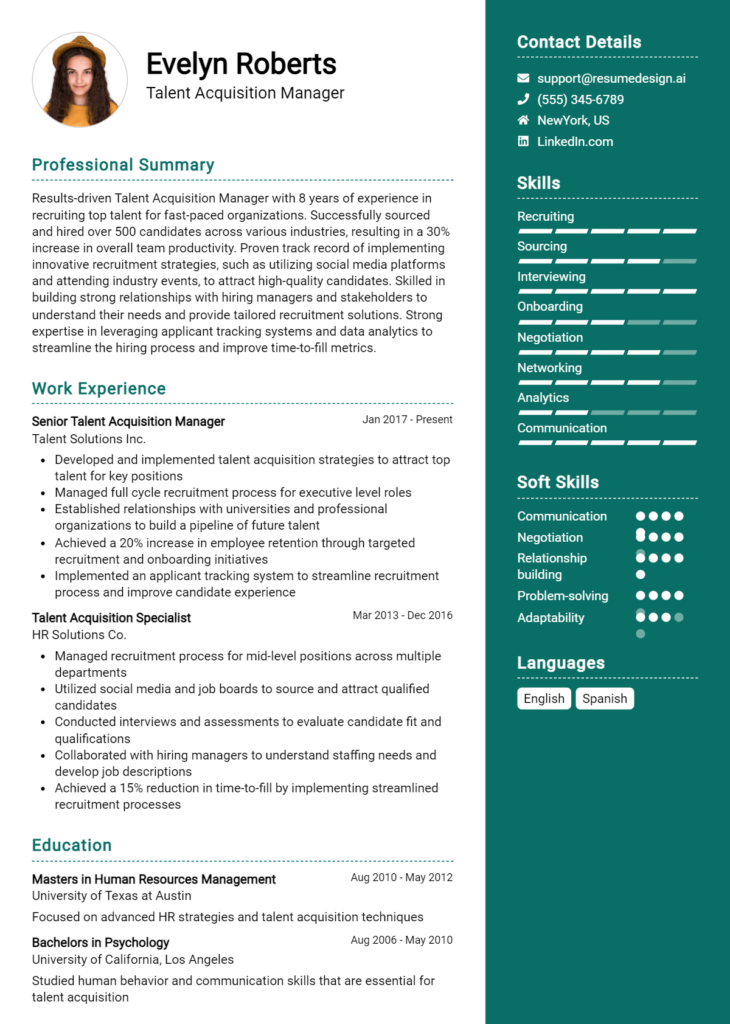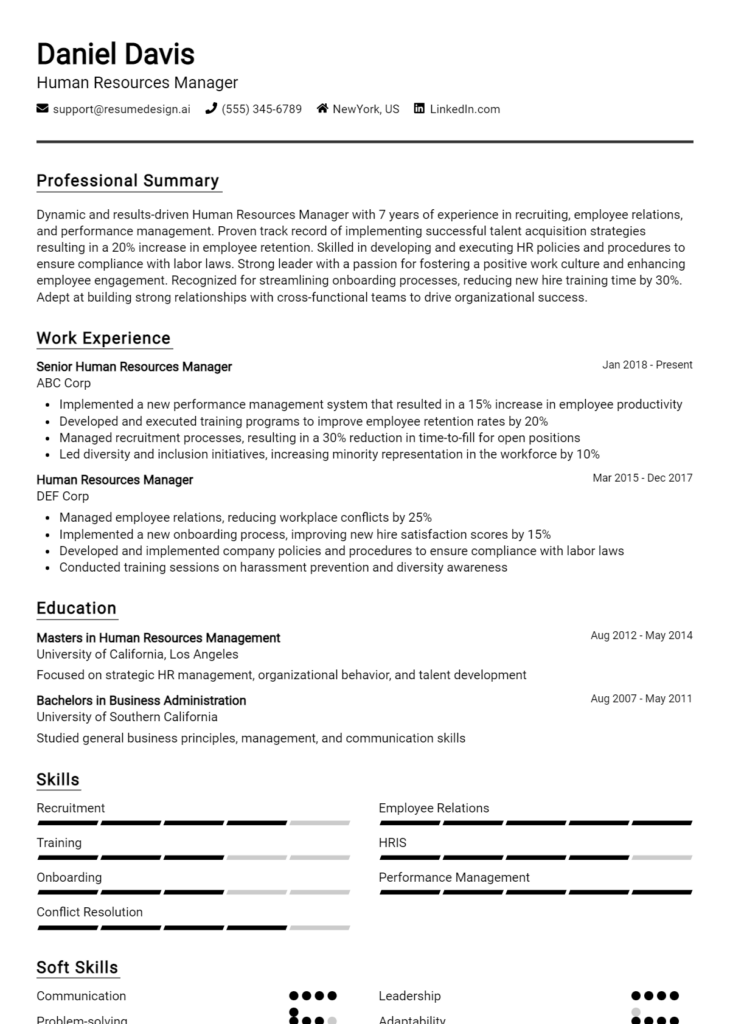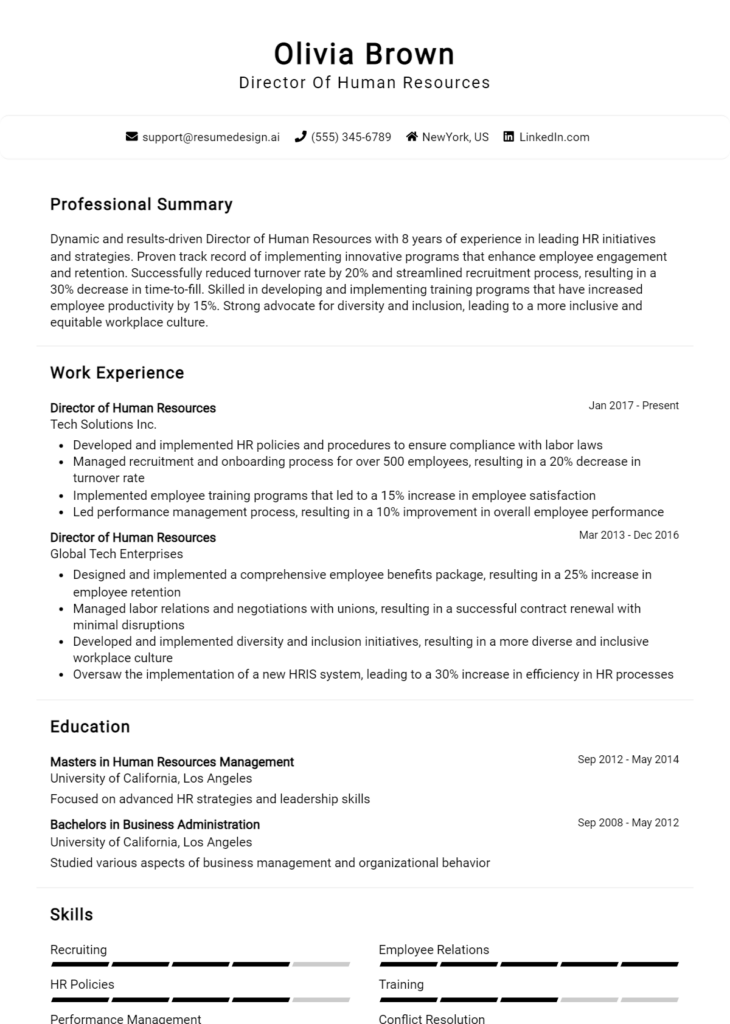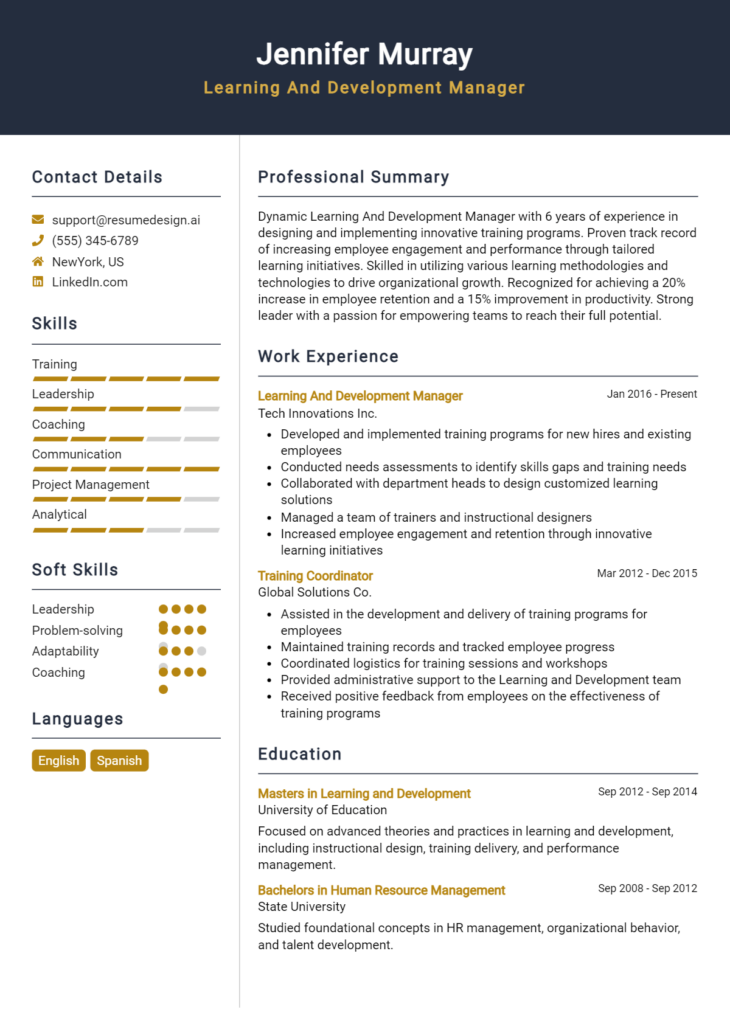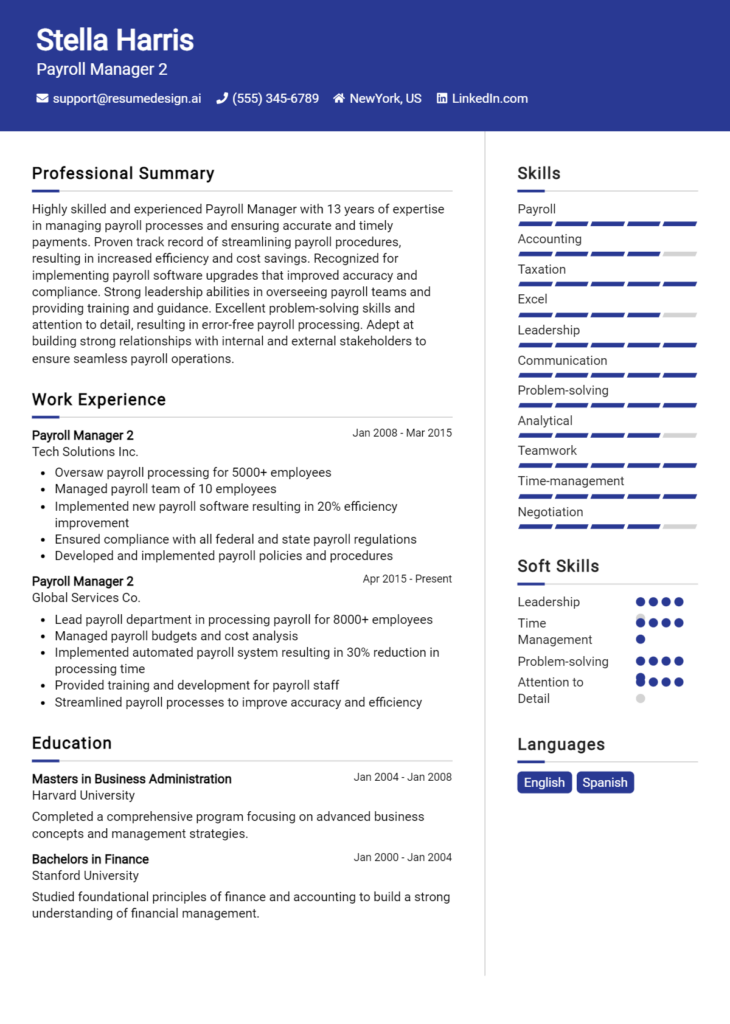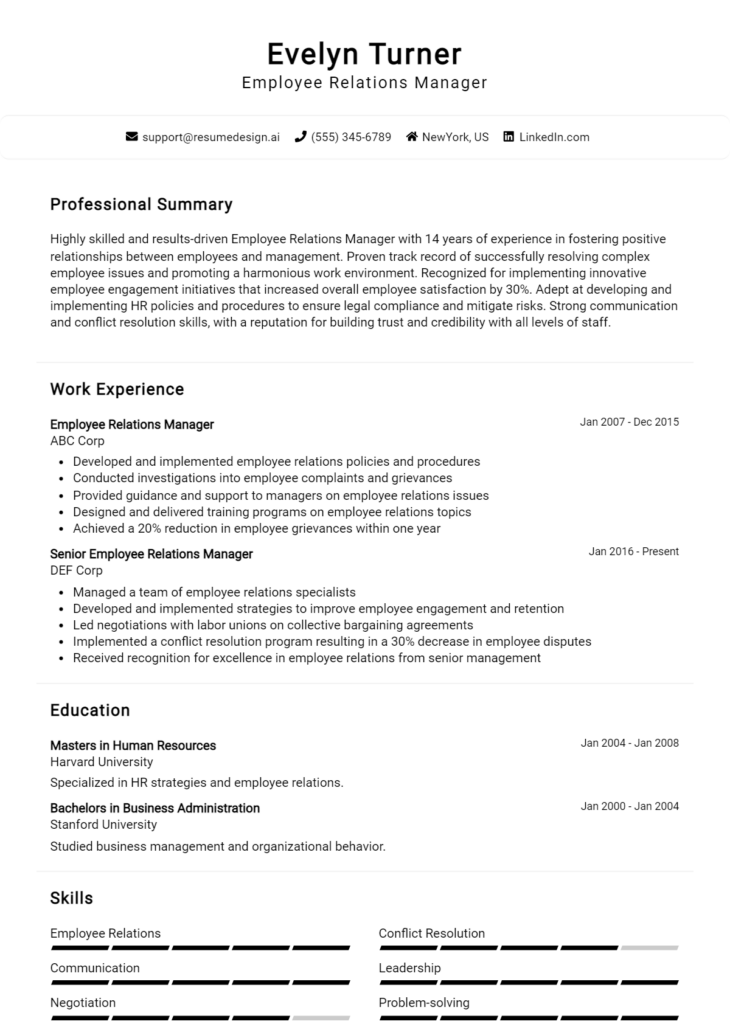Employee Experience Manager Core Responsibilities
The Employee Experience Manager plays a crucial role in enhancing workplace culture by bridging various departments, ensuring collaboration between HR, IT, and operations. Key responsibilities include designing employee engagement initiatives, analyzing feedback to improve workplace policies, and fostering a positive work environment. Successful candidates possess strong technical, operational, and problem-solving skills, enabling them to address employee concerns effectively. A well-structured resume highlighting these qualifications can significantly contribute to achieving the organization's overall goals.
Common Responsibilities Listed on Employee Experience Manager Resume
- Develop and implement employee engagement strategies.
- Analyze employee feedback and survey data to identify areas for improvement.
- Collaborate with HR to enhance recruitment and onboarding processes.
- Facilitate training and development programs to promote employee growth.
- Coordinate cross-departmental initiatives to enhance collaboration.
- Monitor and report on employee satisfaction metrics.
- Design and oversee recognition and reward programs.
- Address and resolve employee concerns and grievances.
- Implement diversity and inclusion initiatives.
- Manage the overall employee experience lifecycle.
- Stay updated on industry trends to inform best practices.
- Foster a culture of continuous improvement and innovation.
High-Level Resume Tips for Employee Experience Manager Professionals
In today’s competitive job market, a well-crafted resume is essential for Employee Experience Manager professionals looking to make a stellar first impression on potential employers. As the initial point of contact between candidates and hiring managers, the resume must effectively showcase not just skills and experiences, but also the unique contributions an individual can bring to enhancing employee satisfaction and engagement. A strong resume can set you apart from the competition, making it crucial to create a document that reflects both your professional journey and your achievements in the field. This guide aims to provide practical and actionable resume tips specifically tailored for Employee Experience Manager professionals, helping you to present your qualifications in the best possible light.
Top Resume Tips for Employee Experience Manager Professionals
- Tailor your resume to align closely with the job description, using keywords and phrases directly from the posting.
- Highlight relevant experience in employee engagement, talent management, or organizational development.
- Quantify your achievements by including metrics and numbers that demonstrate your impact, such as improved employee retention rates or engagement scores.
- Showcase your industry-specific skills, such as knowledge of HR technologies, employee surveys, and change management strategies.
- Include a summary statement at the top of your resume that encapsulates your experience and vision for enhancing employee experiences.
- Utilize bullet points for easy readability, ensuring each point is concise and focused on achievements rather than duties.
- Incorporate soft skills that are vital for the role, such as communication, empathy, and problem-solving abilities.
- List relevant certifications or training related to employee experience, HR, or organizational behavior.
- Keep your resume to a maximum of two pages, ensuring it is clear, well-structured, and free of errors.
- Consider including testimonials or endorsements from previous employers or colleagues to provide additional credibility.
By implementing these tips, you can significantly enhance your chances of landing a job in the Employee Experience Manager field. A strategic and polished resume that highlights your unique qualifications will not only capture the attention of hiring managers but also position you as a strong candidate who understands the importance of fostering a positive workplace culture.
Why Resume Headlines & Titles are Important for Employee Experience Manager
In the competitive landscape of talent acquisition, a well-crafted resume headline or title plays a pivotal role for an Employee Experience Manager. This brief yet powerful statement serves as the candidate's first impression, allowing hiring managers to quickly grasp their key qualifications and relevance to the position. A strong headline not only captures attention but also encapsulates the essence of the candidate’s professional identity in a concise and impactful manner. It should be relevant to the role, reflecting the unique skills and experiences that make the candidate a standout choice for the job.
Best Practices for Crafting Resume Headlines for Employee Experience Manager
- Keep it concise: Aim for one powerful statement, ideally under 10 words.
- Be role-specific: Tailor the headline to the Employee Experience Manager position.
- Highlight key strengths: Focus on your most relevant skills or accomplishments.
- Use action verbs: Start with dynamic verbs to convey confidence and initiative.
- Incorporate industry keywords: Use terms that are commonly recognized in employee experience management.
- Showcase results: If possible, hint at achievements that demonstrate your effectiveness.
- Maintain professionalism: Use a tone that reflects the culture of the organization you are applying to.
- Avoid clichés: Steer clear of overused phrases that fail to differentiate you from other candidates.
Example Resume Headlines for Employee Experience Manager
Strong Resume Headlines
Transformative Employee Experience Manager with 10+ Years in HR Strategy
Innovative Leader in Employee Engagement and Retention Strategies
Dynamic Employee Experience Manager Focused on Enhancing Workplace Culture
Weak Resume Headlines
Experienced Manager
HR Professional Seeking Opportunities
The strong headlines are effective because they are specific, action-oriented, and directly related to the role of an Employee Experience Manager. They not only highlight the candidate's experience but also communicate a clear value proposition to potential employers. In contrast, the weak headlines fail to impress due to their vague nature and lack of relevant detail; they do not provide any insight into the candidate's qualifications or strengths, making it challenging for hiring managers to see the candidate's potential fit for the role.
Writing an Exceptional Employee Experience Manager Resume Summary
Crafting an exceptional resume summary is crucial for an Employee Experience Manager, as it serves as the first impression that hiring managers will have of a candidate. A well-written summary quickly captures attention by succinctly showcasing key skills, relevant experience, and notable accomplishments that align with the job role. Given the competitive nature of the job market, an impactful summary should be concise, engaging, and tailored specifically to the position being applied for, setting the tone for the rest of the resume and encouraging hiring managers to delve deeper into the candidate’s qualifications.
Best Practices for Writing a Employee Experience Manager Resume Summary
- Quantify Achievements: Use numbers and metrics to demonstrate the impact of your work.
- Focus on Skills: Highlight the most relevant skills that align with the job description.
- Tailor for the Job: Customize your summary for each application to reflect the specific requirements of the role.
- Be Concise: Aim for 2-4 sentences that are clear and to the point.
- Use Action Verbs: Start sentences with strong action verbs to convey your contributions effectively.
- Highlight Relevant Experience: Emphasize previous roles that directly relate to employee experience management.
- Showcase Soft Skills: Incorporate interpersonal skills that are essential for managing employee experiences.
- Maintain Professional Tone: Ensure the language is professional and free of jargon that may confuse hiring managers.
Example Employee Experience Manager Resume Summaries
Strong Resume Summaries
Dynamic Employee Experience Manager with over 7 years of experience in enhancing workplace culture and engagement strategies. Successfully implemented a new employee feedback system that increased satisfaction scores by 30% within one year.
Results-oriented Employee Experience Manager skilled in developing programs that enhance employee retention. Achieved a 25% reduction in turnover rates through targeted initiatives and comprehensive onboarding processes.
Innovative HR professional with a proven track record of improving employee engagement through strategic initiatives. Spearheaded a wellness program that resulted in a 40% increase in participation and improved overall employee productivity.
Weak Resume Summaries
Experienced manager looking for a job in employee experience. Good at making employees happy.
I have worked in HR and have some experience with employee programs. I want to help improve the workplace.
The examples above illustrate the distinction between strong and weak resume summaries. The strong summaries effectively quantify achievements and specify relevant skills, showcasing direct impact on employee engagement and retention. In contrast, the weak summaries are vague and lack measurable outcomes, making it difficult for hiring managers to gauge the candidate's potential contributions to the role. A well-crafted summary not only highlights qualifications but also demonstrates a clear understanding of the job's requirements, making a strong case for the candidate's fit for the position.
Work Experience Section for Employee Experience Manager Resume
The work experience section of an Employee Experience Manager resume is crucial as it provides potential employers with insight into the candidate's practical skills and accomplishments. This section highlights the candidate's technical expertise, their ability to manage teams effectively, and their track record of delivering high-quality products and services. By quantifying achievements and aligning experiences with industry standards, candidates can demonstrate their value and suitability for the role, making it a vital component of their overall resume.
Best Practices for Employee Experience Manager Work Experience
- Utilize action verbs to describe your responsibilities and achievements.
- Quantify results with specific metrics, such as percentage improvements or team size.
- Highlight your technical skills relevant to employee experience initiatives.
- Demonstrate collaboration by mentioning cross-departmental projects or teamwork.
- Align your experiences with industry standards and best practices.
- Focus on outcomes that directly contribute to employee engagement and satisfaction.
- Tailor your work experience to reflect the specific job requirements of the role you’re applying for.
- Include examples of innovative solutions you implemented to enhance employee experiences.
Example Work Experiences for Employee Experience Manager
Strong Experiences
- Led a cross-functional team to develop and implement a new employee onboarding program, increasing new hire retention rates by 30% within the first year.
- Conducted quarterly employee engagement surveys, resulting in a 25% increase in overall satisfaction scores and actionable insights that informed HR policies.
- Managed a project to enhance the company’s recognition program, which boosted employee participation by 50% and improved morale significantly.
- Utilized data analytics to identify turnover trends, leading to the development of targeted retention strategies that reduced turnover by 15% over 12 months.
Weak Experiences
- Worked on employee engagement projects.
- Assisted in planning company events.
- Involved in team meetings regarding employee satisfaction.
- Helped with onboarding new employees.
The examples provided illustrate a clear distinction between strong and weak experiences. Strong experiences are characterized by specific achievements, quantifiable outcomes, and a clear demonstration of technical leadership and collaboration. They provide concrete evidence of the candidate's impact on the organization. In contrast, weak experiences lack detail, specific metrics, and do not convey a sense of accomplishment, making them less compelling to potential employers.
Education and Certifications Section for Employee Experience Manager Resume
The education and certifications section of an Employee Experience Manager resume serves as a critical component that underscores the candidate's academic foundation and professional qualifications. This section not only highlights relevant degrees and industry-recognized certifications but also showcases the candidate's commitment to continuous learning and professional development. By providing specific coursework, certifications, and specialized training, candidates can enhance their credibility and demonstrate their alignment with the competencies required for the Employee Experience Manager role. This attention to education and certifications can significantly influence a hiring manager's perception and decision-making process.
Best Practices for Employee Experience Manager Education and Certifications
- Prioritize relevant degrees such as Human Resources, Organizational Psychology, or Business Administration.
- Include industry-recognized certifications like SHRM-CP, PHR, or CHRP to establish credibility.
- List any specialized training programs focused on employee engagement, performance management, or workplace culture.
- Detail relevant coursework that directly pertains to employee experience, organizational behavior, or change management.
- Highlight advanced degrees (e.g., Master's or MBA) that signify deeper knowledge and leadership capability.
- Ensure clarity and professionalism in presentation, including dates and institutions where applicable.
- Tailor the education section to reflect qualifications that are most relevant to the specific job description.
- Consider including ongoing education or workshops to showcase commitment to professional growth.
Example Education and Certifications for Employee Experience Manager
Strong Examples
- M.A. in Organizational Psychology, University of XYZ, 2021
- Certified Employee Experience Professional (CEEP), 2022
- SHRM Certified Professional (SHRM-CP), 2023
- Coursework in Change Management and Employee Engagement Strategies, University of XYZ
Weak Examples
- Bachelor's in English Literature, University of ABC, 2010
- Certification in Social Media Marketing, 2020
- High School Diploma, 2005
- Outdated certification in Office Management, 2015
The strong examples are considered effective because they align directly with the competencies required for an Employee Experience Manager role, showcasing relevant degrees, recognized certifications, and coursework in pertinent fields. In contrast, the weak examples highlight qualifications that are either irrelevant to the position or outdated, which could detract from the candidate's appeal to potential employers seeking specialized expertise in employee experience management.
Top Skills & Keywords for Employee Experience Manager Resume
An Employee Experience Manager plays a crucial role in shaping the workplace culture and enhancing employee satisfaction. A well-crafted resume for this position should highlight both hard and soft skills that demonstrate the candidate's expertise in managing employee engagement, promoting a positive workplace environment, and implementing effective HR strategies. The right balance of skills not only showcases an applicant's qualifications but also aligns with the organization's values and goals, making it essential to tailor this aspect of the resume to stand out. For more insights on how to effectively include skills and work experience in your resume, continue reading.
Top Hard & Soft Skills for Employee Experience Manager
Soft Skills
- Communication
- Empathy
- Conflict Resolution
- Leadership
- Adaptability
- Problem-Solving
- Emotional Intelligence
- Collaboration
- Creativity
- Active Listening
- Cultural Awareness
- Time Management
- Negotiation
- Change Management
- Team Building
- Customer Service Orientation
- Strategic Thinking
Hard Skills
- Employee Engagement Strategies
- HR Analytics
- Performance Management Systems
- Employee Onboarding Processes
- Diversity and Inclusion Initiatives
- Data Analysis and Reporting
- Project Management
- Training and Development Programs
- Compensation and Benefits Administration
- Workplace Wellness Programs
- Compliance and Labor Law Knowledge
- Technology Utilization (HRIS, ATS)
- Change Management Frameworks
- Survey and Feedback Mechanisms
- Stakeholder Engagement
- Budget Management
- Policy Development and Implementation
Stand Out with a Winning Employee Experience Manager Cover Letter
Dear Hiring Manager,
I am excited to apply for the Employee Experience Manager position at [Company Name], as advertised on [Job Board/Company Website]. With a robust background in human resources and a passion for fostering engaging workplace environments, I believe I am well-equipped to contribute to your organization's goal of enhancing employee satisfaction and performance. My experience in designing and implementing employee engagement initiatives has consistently resulted in improved morale and productivity, making me an ideal candidate for this role.
In my previous position at [Previous Company Name], I successfully led a team to develop a comprehensive employee feedback program that utilized surveys, focus groups, and one-on-one interviews to assess employee satisfaction and identify improvement areas. This initiative not only provided valuable insights but also fostered a culture of open communication where employees felt valued and heard. As a result, we observed a 25% increase in overall employee engagement scores within the first year. I am eager to bring this same commitment to fostering an inclusive and dynamic workplace culture to [Company Name].
I am particularly impressed by [Company Name]'s dedication to [specific company value or initiative], and I am excited about the opportunity to contribute to such a forward-thinking organization. My approach to employee experience emphasizes collaboration, innovation, and continuous improvement, ensuring that employee needs are met while aligning with organizational goals. I am confident that my strategic mindset and hands-on experience in crafting exceptional employee experiences will help [Company Name] attract and retain top talent.
Thank you for considering my application. I look forward to the opportunity to discuss how my skills and experiences align with the vision of [Company Name]. I am eager to contribute to creating a workplace where every employee feels valued, engaged, and motivated to excel.
Sincerely,
[Your Name]
[Your Phone Number]
[Your Email Address]
Common Mistakes to Avoid in a Employee Experience Manager Resume
When crafting a resume for the role of Employee Experience Manager, it is crucial to present your qualifications and experiences effectively. Many candidates inadvertently make common mistakes that can weaken their application and prevent them from standing out in a competitive job market. By being aware of these pitfalls, you can enhance your resume and better showcase your suitability for the position. Here are some common mistakes to avoid:
Generic Objective Statement: Using a one-size-fits-all objective fails to capture your unique skills and contributions. Tailor your objective to reflect your specific goals and how they align with the organization’s mission.
Overloading with Jargon: While industry-specific terminology can demonstrate expertise, excessive jargon can alienate hiring managers. Aim for clarity and ensure your resume is accessible to a broad audience.
Neglecting Quantifiable Achievements: Failing to include measurable results can make your accomplishments seem less impactful. Use metrics and data to illustrate the success of your initiatives in previous roles.
Ignoring the Importance of Soft Skills: As an Employee Experience Manager, interpersonal skills are vital. Omitting soft skills, such as communication and empathy, can undermine your qualifications for fostering a positive workplace culture.
Lack of Customization: Submitting a generic resume without tailoring it to the specific job description can signal a lack of genuine interest. Customize your resume by incorporating keywords and relevant experiences that align with the job requirements.
Cluttered Format: A resume that is difficult to read due to poor formatting can frustrate hiring managers. Use a clean, professional layout with clear headings, bullet points, and adequate white space to enhance readability.
Excessive Length: A lengthy resume can overwhelm readers and dilute your key messages. Aim to keep your resume concise, ideally one to two pages, focusing on the most relevant experiences and accomplishments.
Ignoring the Cover Letter: Many candidates overlook the importance of a cover letter, which can complement your resume. A well-crafted cover letter provides an opportunity to elaborate on your passion for the role and connect your experiences to the company’s needs.
Conclusion
As an Employee Experience Manager, your role is pivotal in shaping a positive workplace culture and enhancing employee engagement. Key responsibilities include developing strategies for employee retention, conducting surveys to gather feedback, and implementing programs that foster a sense of belonging and satisfaction. Additionally, strong communication and analytical skills are essential for assessing employee needs and measuring the effectiveness of initiatives.
In conclusion, if you’re looking to advance your career in this vital role, it’s crucial to ensure your resume reflects your skills and experiences effectively. Take the time to review and update your Employee Experience Manager resume to stand out in the competitive job market.
To assist you in this process, consider utilizing the following resources:
- Explore resume templates to find a professional layout that highlights your strengths.
- Use the resume builder for a step-by-step approach to crafting a polished resume.
- Check out resume examples to gain inspiration from successful candidates in your field.
- Don’t forget to complement your resume with a compelling cover letter; find various cover letter templates that can help you make a strong first impression.
Take action today and refine your resume to showcase your qualifications as an Employee Experience Manager!

